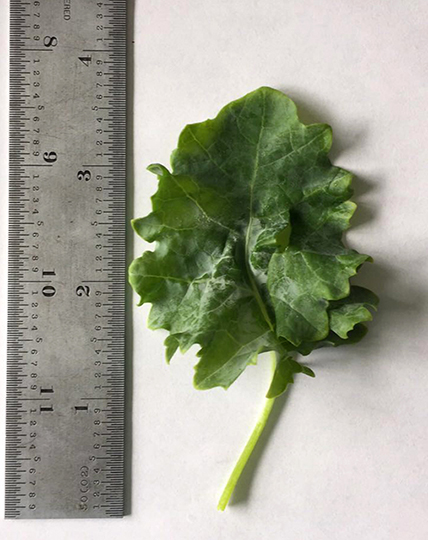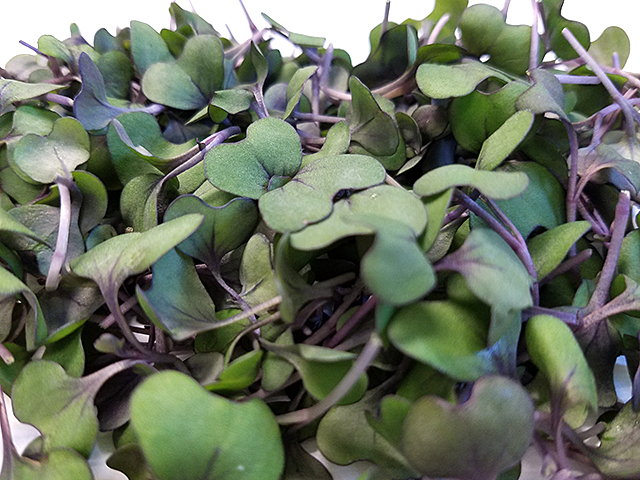
Diet, Food, and Cancer Prevention
 |
Dr. Thomas Wang is the Research Leader at the Diet, Genomics and Immunology Laboratory located in Beltsville, MD. |
Welcome Dr. Wang to Under the Microscope.
UM – First off, is there a relationship between diet and cancer?
TW – It's hard to really give a definitive answer — it is difficult to assign a causal effect of diet on a cancer, primarily because it's difficult to extrapolate population data to the individual level. There are many other complicating factors, including individual differences and the complexity of diet composition. In addition, cancer is not just one disease. Each individual cancer is different, so the effect of diet may also be different.
We're still far from being able to give definitive and specific guidance on diet with regard to cancer, but I personally think diet may create a permissive environment to either promote or lower cancer risk. Given that this possible relationship may involve many factors and variables, a more holistic approach to the problem is necessary. Advances in omics (branches of science such as genomics, proteomics, etc.) technology and AI-assisted analysis may provide an approach to go forward. We are using such experimental tools in the hope to help us identify patterns to come up with follow up hypotheses/experiments and eventually more definitively determine correlations between cancer and diet.
UM – Are there certain foods that could increase your risk of developing certain types of cancers?
TW – Again, this is a 'maybe' situation. For example, studies suggest alcohol consumption may increase risk for some cancers. But there are other variables associated with a food's effect on cancer risk, such as how/where it's grown or processed.
Additionally, cancer development normally takes many years. A food's composition may change during that lengthy timeline and make any correlations much harder to decipher. One example is grilled meat (the compounds produced during grilling) and colon cancer; there might be a higher risk for colon cancer associated with grilled meat consumption, but when we look at it at an individual level, things get a bit murkier. Exposure (like how often you eat it), what other foods are included in the diet, the individual's genetics, and the enzymes involved in processing carcinogens all play a role in modulating the risk. It is very difficult to control all the parameters to obtain a definitive answer.

ARS chemist Tom Wang prepares to examine human THP-1 cells, which are used to study leukemia cell lines. (Photo by Stephen Ausmus, D3454-2)
UM – How can food choices impact your chances of developing cancers or other chronic complications?
TW – Based on existing literature, a diet that's rich in fruits and vegetables, such as the Mediterranean diet, tends to be associated with the promotion of health, including prevention of certain cancers and chronic diseases.
However, one may want to think in terms of diet as a whole rather than picking and choosing a specific food. The data on a specific food is a bit weaker as many variables such as other foods in the diet, processing, growing conditions may also impact the health endpoints.
UM – Besides their diet, what else should consumers consider as they plan meals aiming to prevent cancers?
TW – Exercise may be one factor that would complement a healthy diet. For example, obesity is often associated with risk of developing chronic diseases and cancers. A diet that is high in fat and calories plus subpar levels of exercise seems to be the worst combination of life style (i.e., developing obesity) for an individual. Therefore, in addition to maintaining a healthy diet, keeping an active lifestyle would be beneficial.

Baby kale grown in collaboration with the Food Quality Laboratory in Beltsville, MD. Vegetables like these are being examined by ARS scientists for their effects on the gut microbiome and immune systems. (Photo by ARS)
UM – Other than cancer, what other disease risks can be lowered or mitigated with an improved diet?
TW – There are several — obesity and diabetes are the most prominent ones. These diseases are known to be associated with diet and the risks may be mitigated by eating a healthy diet. However, I need to emphasize that individual differences may affect how much a diet can impact risk.
UM – Are there certain families of vegetable or fruit that are especially beneficial to the immune system? For example, cruciferous vegetables like broccoli and cauliflower, or citrus fruits.
TW – Many publications, including ours, suggest that food or diet can be protective against inflammation and thus beneficial to the immune system.
In most cases, the information is often obtained from animal, in-vitro, or correlation studies. When it comes to validation and causal relationships, the literature is scarce. Fruits and vegetables provide many essential nutrients (such as vitamins) and compounds that are crucial in cell metabolism and other general functions. For example, immune cells need these nutrients for their development and maintenance.
Additionally, many plant-derived compounds have been found to have anti-inflammatory effects. For example, we work with cruciferous vegetables and compounds that are derived from them. We found that certain compounds may protect against bacterial infection by preventing the attachment of bacteria to intestinal cells and thus prevent inflammation. However, as mentioned previously, these effects need to be validated in humans.

Close-up on red cabbage microgreens grown in collaboration with the Food Quality Laboratory. Research suggests that fruits and vegetables contain many essential nutrients and compounds that may help fight inflammation. (Photo by ARS).
UM – Inflammation is another problem that many people are concerned about. What kinds of food are good at mitigating inflammatory responses?
TW – According to existing research, there are reports of food or food-derived compounds that can mitigate inflammatory responses. Cruciferous vegetables, yogurts, and fermented foods are just a few. But again, information on validation of causal effects in human is scarce. The potential is there, though.
However, on the flip side, food and food-derived components that cause inflammation are more substantiated in the literature. Food that causes allergies, such as gluten, peanuts, etc. are known to have causality and mechanisms are clearer regarding eliciting an inflammatory response. For those suffering from allergies, avoiding those foods would mitigate inflammation.
UM – How does food preparation impact the nutrient profile and potential health benefits of a food? For example, boiling versus frying versus baking.
TW – Food processing, such as heating, is known to sometimes degrade certain beneficial compounds (like vitamins) as well as candidate healthy compounds. Procedures such as frying or grilling also may introduce potential carcinogens but processing like freezing may actually maintain certain vitamin levels in foods.
Interestingly, food processing also can generate purported beneficial compounds. Cruciferous vegetables are a good example. Chopping up these vegetables would activate an enzyme called myrosinase. The enzyme acts on a group of compounds call glucosinolates. This action will generate other compounds such as the indoles and isothiocyanates, which are reported to have anti-cancer and anti-inflammatory effects.
Another example is the heating of potato starch to generate non-digestible resistant starch. According to some studies, this resistant starch can promote a healthy gut microbiome and generate compounds that can promote general intestinal health. We work on these aspects using in-vitro and animal methodologies to test their efficacies and to better understand the underlying mechanisms. So, processing may have positive or negative effects depending on what compound, food, and biological endpoint we are talking about. This is what makes things a bit more complicated and difficult to provide a straightforward answer..
UM – Is it more important to focus on nutritional benefits from whole foods or the individual healthful compounds in food?
TW – At this point, the literature seems to support considering diet as a whole may be better. Some recent studies on the effect of diet on the microbiome indicate stronger correlations of microbiome changes with broad food category (like vegetables), then go down to specific food or compounds.
When you go down the path of specific food or compounds, you will often get a mixed message from the existing literature and research. The system is just a bit too complicated and not everything is known. Like I mentioned before, growing conditions, processing, individual differences, time/length of exposure all play a role in the ultimate outcome in terms of health.
UM – What diet-disease prevention research projects are you currently working on?
TW – I am personally very interested in breast, colon, and prostate cancer prevention. Currently, we are looking at inflammation as the "mother of all problems" and trying to identify diets and compounds that can overcome the deleterious effects of inflammation.
Inflammation is associated with increased risk for obesity-related chronic diseases as well as certain cancers. Therefore, modulation of inflammation may be important and warrants additional research. Modulation of the gut microbiome is one of the potential mechanisms we are exploring and AI as a tool are being used to identify possible correlations. There are certainly a lot of different foods, diets, as well as compounds out there to keep us all very busy.
UM – And finally, what do you see in the future for your research?
TW – Today, buzzwords like "precision nutrition" or "personalized nutrition" are becoming popular. I see these approaches as nutrition for an individual in the context of health promotion. Some of our work already looks into this and it'll continue to be a focus. For my personal interests, I am exploring the possibility of harnessing the advances in computation biology to develop some kind of predictive model that can predict the outcome of a diet to mitigate or enhance the risk of cancers or other diet-related chronic diseases at the individual level. — by Georgia Jiang, ARS Office of Communications.
